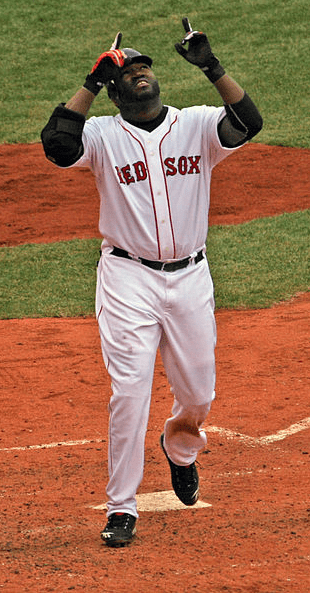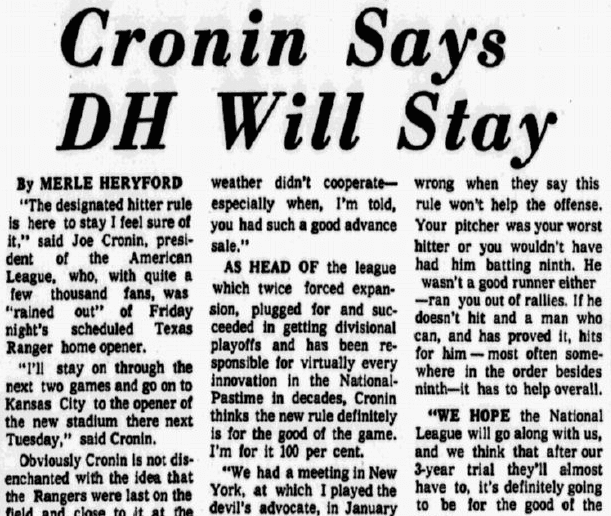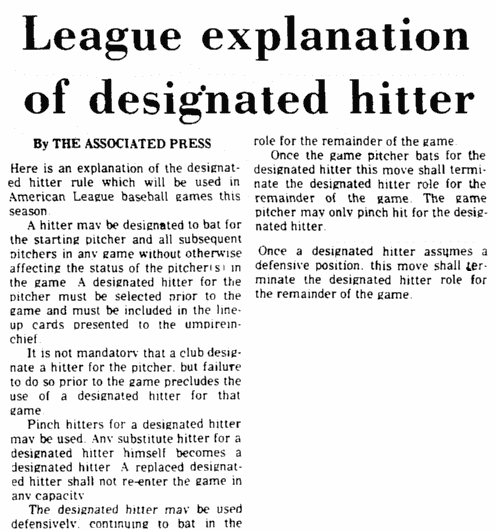On 6 April 1973, Major League Baseball’s American League implemented a three-year experiment that became a permanent feature of the league: the designated hitter rule, allowing another player to bat for the pitcher. Since pitchers are normally weaker hitters than position players (since they focus more on pitching than batting practice, and because they do not play every day), this rule has supplied more offense to American League teams.

However, baseball purists lamented the implementation of this rule and have opposed it ever since. The National League, the older of the two established Major Leagues, has refused to adopt the designated hitter.
Beginning in 2010, the designated hitter is used in all All-Star Games. However, for interleague games and the World Series, the designated hitter is only used in games played in an American League ballpark. It appears this will be the permanent arrangement, as the National League has shown no inclination to take away the pitcher’s traditional role as a hitter, and all the strategy that accompanies having the pitcher bat.
The following two newspaper articles were published when the designated hitter rule went into effect. The first article describes American League President Joe Cronin’s enthusiastic embrace of the rule; the second article explains this new rule so that baseball fans will understand how it is being used.

Here is a transcription of this article:
Cronin Says DH Will Stay
By Merle Heryford
“The designated hitter rule is here to stay, I feel sure of it,” said Joe Cronin, president of the American League, who, with quite a few thousand fans, was “rained out” of Friday night’s scheduled Texas Ranger home opener.
“I’ll stay on through the next two games and go on to Kansas City to the opener of the new stadium there next Tuesday,” said Cronin.
Obviously Cronin is not disenchanted with the idea that the Rangers were last on the field and close to it at the gate last season, in their Texas inaugural.
“I think you’ve helped your club tremendously over the winter,” he said, “and it’s really unfortunate that the weather didn’t cooperate – especially when, I’m told, you had such a good advance sale.”
As head of the league which twice forced expansion, plugged for and succeeded in getting divisional playoffs, and has been responsible for virtually every innovation in the National Pastime in decades, Cronin thinks the new rule definitely is for the good of the game: “I’m for it 100 per cent.”
“We had a meeting in New York, at which I played the devil’s advocate in January with the umpires, and we were prepared for every eventuality.
“As a result, it worked smoothly, very very smoothly, this spring. We felt we could have had a much better picture of how it will work eventually if the National League had gone along with us, but we didn’t have a hitch. We had tried to anticipate every possibility, and most of them showed up.
“I feel that this is a wonderful addition to the game. Regardless of claims to the contrary, by some players and managers, I’m certain it will stimulate the offense, and that’s what a lot of people have been screaming for recently.
“I don’t see, as some claim, how it can possibly cut down on strategy. You used to walk a man to get to the pitcher, who couldn’t do much but bunt, and, if you knew he was going to do that, you could plan accordingly.
“Now do you dare walk a man to get to the designated hitter or do you pitch away and take your chances?
“You use to pull the starter late in the game and bring in a reliever, after pinch hitting or before, late in the game if the score was close. But if the reliever didn’t go well – say he got bombed – you wished you’d have stayed with the starter. And you’ll stay with him more now perhaps. But that doesn’t prove there’ll be fewer runs. Starters get tired, and the designated hitter is sure piling up better averages this spring than the pinch hitters and the pitchers combined.
“That’s why I think they’re wrong when they say this rule won’t help the offense. Your pitcher was your worst hitter or you wouldn’t have had him batting ninth. He wasn’t a good runner either – ran you out of rallies. If he doesn’t hit and a man who can, and has proved it, hits for him – most often somewhere in the order besides ninth – it has to help overall.
“We hope the National League will go along with us, and we think that after our 3-year trial they’ll almost have to, it’s definitely going to be for the good of the game.
“They didn’t favor divisional play, but after we proved its merit and its gate appeal, they’re all for it now.
“The designated hitter, too, should prove to the fan that he’s wrong when he claims that we’re playing under 100-year-old rules and won’t change.
“And, best of all, it won’t eliminate one second guesser. Second guessers have built baseball. There isn’t a sport where the fan thinks he knows more about the rules and strategy than baseball. And he never misses a chance to tell you. They’ve kept the sport alive.
“You think they aren’t going to second guess every manager on this rule – who he uses as a designated hitter, when he changes pitchers or doesn’t, when he changes designated hitters, when he pinch hits? And we still will pinch hit at times. We’ll even let the pitcher bat occasionally. I’m sure of it.
“I think it’s great. I believe it’s here to stay. And I’m just happy that, once more, the American League was out front in something that was good for baseball.”

Here is a transcription of this article:
League Explanation of Designated Hitter
By The Associated Press
Here is an explanation of the designated hitter rule which will be used in American League baseball games this season.
A hitter may be designated to bat for the starting pitcher and all subsequent pitchers in any game without otherwise affecting the status of the pitcher(s) in the game. A designated hitter for the pitcher must be selected prior to the game and must be included in the lineup cards presented to the umpire-in-chief.
It is not mandatory that a club designate a hitter for the pitcher, but failure to do so prior to the game precludes the use of a designated hitter for that game.
Pinch hitters for a designated hitter may be used. Any substitute hitter for a designated hitter himself becomes a designated hitter. A replaced designated hitter shall not re-enter the game in any capacity.
The designated hitter may be used defensively, continuing to bat in the same position in the batting order, but the pitcher must then bat in the place of the substituted defensive player, unless more than one substitution is made, and the manager must then designate their spots in the batting order.
A runner may be substituted for the designated hitter and the runner assumes the role of the designated hitter.
A designated hitter is “locked” into the batting order. No multiple substitutions may be made that will alter the batting rotation of the designated hitter.
Once the game pitcher is switched from the mound to a defensive position, this move shall terminate the designated hitter role for the remainder of the game.
Once a pinch hitter bats for any player in the batting order and then enters the game to pitch, this move shall terminate the designated hitter role for the remainder of the game.
Once the game pitcher bats for the designated hitter this move shall terminate the designated hitter role for the remainder of the game. The game pitcher may only pinch hit for the designated hitter.
Once a designated hitter assumes a defensive position, this move shall terminate the designated hitter role for the remainder of the game.
Related Articles:
